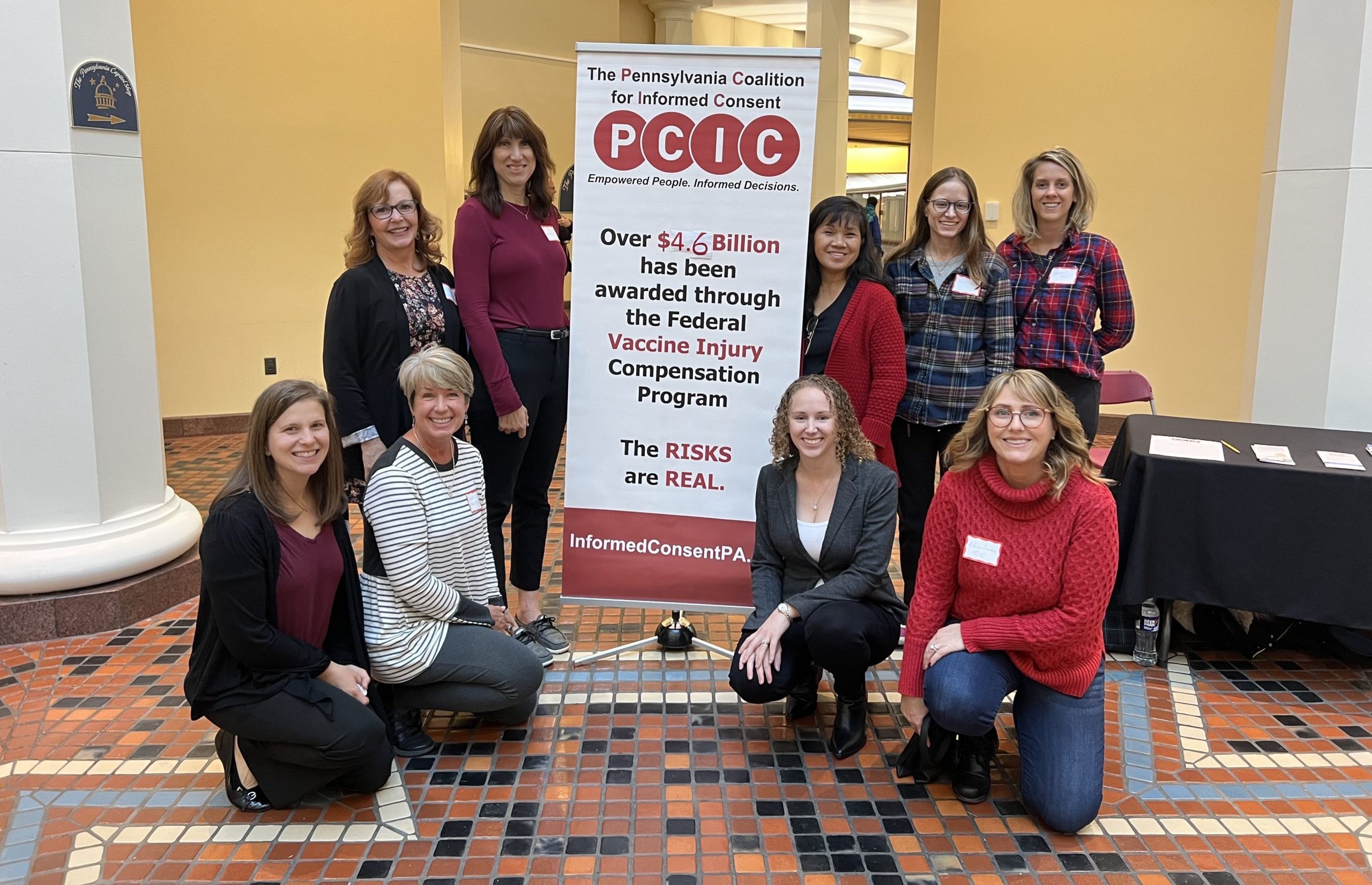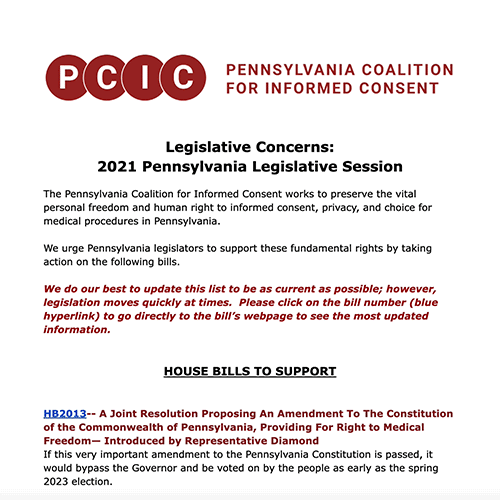Legislative Advocacy
Advocacy on the state level is vital to the medical freedom movement. Whether it is learning about bills or discussing problems with legislators, advocates play the role of liaison between the people and elected legislators. Below you’ll find basic information about the legislative process, tips on speaking with legislators, and ways to stay up-to-date on current medical freedom legislation that may impact those living and working in Pennsylvania.
PA Capitol Lobby Day
Participating in a PCIC lobby day is a fantastic way to immerse yourself in the legislative process. Our Capitol Coordinators have been hosting events and meeting with state legislators since our beginning in 2015. The knowledge our advocates have gained is an invaluable gift that they want to share with you! In order to make this simple and easy, we’ve created a Legislative Basics – Capitol Lobby Guide to provide everything you need to know. In addition to meeting with legislators, PCIC Capitol Lobby Day events include hand delivering cards, providing on-site training courses, and hosting public information tables in the rotunda. Key tips from our guide include: convenient parking locations, what to expect, suggested attire, lunch options, and more.
Most lobby days are scheduled from 10am until 2pm. If you are interested in joining, please email the Harrisburg Capital Area chapter group PCICCapitalArea@gmail.com. Upcoming 2025 Lobby Days are:
Wednesday, January 28th
Monday, February 2
Wednesday, March 25
Monday, April 13
Wednesday, May 6
Monday, June 1

Building Relationships with Your Legislators

You are the best expert on your life and experiences related to medical freedom. Your legislator should know your personal story when they are representing you. We encourage you to meet with your legislators regularly. Individuals can request a meeting by contacting their state representatives. You can coordinate within your chapter group, friends and family to bring additional constituents to your meetings. We’ve created a Legislative Advocacy Basics – Meeting Your Legislator Guide to help you with this.
Tutorials
Your voice has power, and the following tutorial session will teach you how to use it effectively to influence legislation. Pharmaceutical and medical trade lobbyists often push for what benefits their industries’ bottom line, not your health. Big tech, the media, and the pharmaceutical industry have gone to great lengths to control the narrative about vaccine safety. Those who are concerned about vaccine safety, adverse effects, and freedom of choice need to be empowered to share their knowledge and experiences.
NVIC’s Dawn Richardson discusses Legislative Advocacy Tips in this one-hour CHD.TV video from January 3, 2022. Watch other key Advocacy Lifeline Show videos hosted by CHD.TV each Monday including episode 29 – Why Talking to Legislators Matters, Legislative Primer.
Learn how the legislative process works in this 30-minute advocacy tutorial from The National Vaccine Information Center (NVIC).
Advocacy Basics
About the PA General Assembly
The Pennsylvania state government consists of legislative bodies: the House of Representatives and the Senate. The House of Representatives is made up of 203 members who serve two-year terms. The Senate is made up of 50 members who serve four-year terms. Elections for Senators are staggered so that half of them are up for election every two years. Senators and Representatives have a local office in the community they serve and a state office which is located in the Capitol building in Harrisburg.

Terms to Know
BILL: a draft of a proposed law presented to legislation. See this Making Law document for details on this legislative tool.
ACT: a bill that has been enacted into law after being passed in both the House and Senate, and reviewed and signed by the governor
AMENDMENT: any alteration made to a bill or clause
GENERAL ASSEMBLY: the legislative body of senators and representatives
COMMITTEE SYSTEM: Much of the legislative work is done in committees. When a bill is introduced it is referred to the appropriate legislative committee. There are 22 permanent – or standing – committees in the Senate and 28 standing committees in the House.
Identifying Your Legislators
Enter your address here and click “Search”. For PA state legislative activities, you’ll want to note your PA House and PA Senate representatives. Also note the districts they represent. Click on the names of your representatives to find brief biographies, committee assignments and contact information. Select a “Stay Connected” option to sign up for newsletters via their individual websites and to follow your state representative on social medias.
Fun Facts for Kids
Whether you’re visiting Pennsylvania for the first time, or just getting to know more about the state you live in, here are all the fun facts and must-know details about our commonwealth.
PA Informed Consent Bills
PCIC has compiled a list of bills that we watch each session. This summary tool can help you determine which bills to focus on with your legislator. It is a great print-out to have when meeting with your representative.

Federal Representation
PA has two U.S. Senate and 18 U.S. House representatives that make up the U.S. Congress. These Congressional members, composed of Senators and Representatives, are assigned to committees that represent our nation’s affairs. U.S. Senators serve for six years while U.S. Representatives serve for two years. Additional information can be found at www.senate.gov and hwww.house.gov.
When you are looking up your legislators, make sure to note which legislators are federal, and which are state. Federal legislators make laws for the entire U.S., while PA state legislators make laws specifically for PA. PCIC tends to focus on state legislation, so will typically ask you to contact your state Representative and state Senator. Federal bills we’re watching can be found on NVIC Advocacy’s portal: nvicadvocacy.org/members/National.

BILLS WE'RE WATCHING

ACTION ALERTS

DONATE
